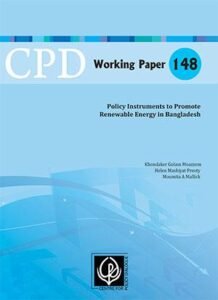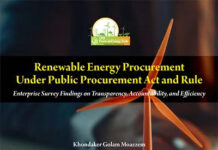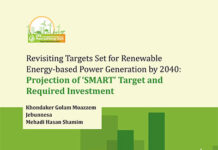 Based on global and regional geopolitical considerations, as well as the challenges posed by climate change, Bangladesh has made commitments in both national and international levels to increase the proportion of RE within its energy sector. But the measures being taken are insufficient to fulfil the commitments as the domestic energy policy landscape is yet to establish RE as a feasible power generation source to meet the domestic requirements. This study will identify the barriers and weaknesses within Bangladesh’s energy policy landscape that hinder the attraction of domestic and foreign investments in RE-based power generation. For Bangladesh, a few additional policy instruments may be helpful to support the RE within the existing policy landscape. This study also attempts to grade the reflection of the RE supporting policy instruments such as RPS, strategic planning, tax incentives, financing and refinancing, grants and subsidies, net-metering, and feed-in tariff to rank the category of the selected policies as high, medium, and low. The RE Policy is found to be the most inclusive policy followed by the MCPP. It is discouraging that the energy policy of Bangladesh consists only of two RE-supportive policy instruments, whereas it should have been the most concrete and comprehensive policy document. Further, the study seeks to justify that Bangladesh has sufficient RE resources to achieve the RE goals and targets by accumulating empirical evidence or studies on Bangladesh. Although sufficient policies related to RE are there, a lack of intention and political conflict of interest make the implementation of those policies much harder. By amending the RE policies and building coherence among the public policies, Bangladesh can surely improve the RE landscape. Allocation for RE-based research with higher relative incentives in the sector, aggressive policies to attract private sector investment and promoting domestic investment can help achieve the RE targets smoothly.
Based on global and regional geopolitical considerations, as well as the challenges posed by climate change, Bangladesh has made commitments in both national and international levels to increase the proportion of RE within its energy sector. But the measures being taken are insufficient to fulfil the commitments as the domestic energy policy landscape is yet to establish RE as a feasible power generation source to meet the domestic requirements. This study will identify the barriers and weaknesses within Bangladesh’s energy policy landscape that hinder the attraction of domestic and foreign investments in RE-based power generation. For Bangladesh, a few additional policy instruments may be helpful to support the RE within the existing policy landscape. This study also attempts to grade the reflection of the RE supporting policy instruments such as RPS, strategic planning, tax incentives, financing and refinancing, grants and subsidies, net-metering, and feed-in tariff to rank the category of the selected policies as high, medium, and low. The RE Policy is found to be the most inclusive policy followed by the MCPP. It is discouraging that the energy policy of Bangladesh consists only of two RE-supportive policy instruments, whereas it should have been the most concrete and comprehensive policy document. Further, the study seeks to justify that Bangladesh has sufficient RE resources to achieve the RE goals and targets by accumulating empirical evidence or studies on Bangladesh. Although sufficient policies related to RE are there, a lack of intention and political conflict of interest make the implementation of those policies much harder. By amending the RE policies and building coherence among the public policies, Bangladesh can surely improve the RE landscape. Allocation for RE-based research with higher relative incentives in the sector, aggressive policies to attract private sector investment and promoting domestic investment can help achieve the RE targets smoothly.
Authors: Khondaker Golam Moazzem, Helen Mashiyat Preoty and Moumita A Mallick
Publication Period: December 2022




![Currents of Change [Volume-3, Brief-02] Quarterly Brief of the Power & Energy Sector of Bangladesh](https://cpd-power-energy-study.com/wp-content/uploads/2026/02/Quarterly-Brief-of-Power-Energy-Sector-of-Bangladesh-3-cover-218x150.jpeg)



